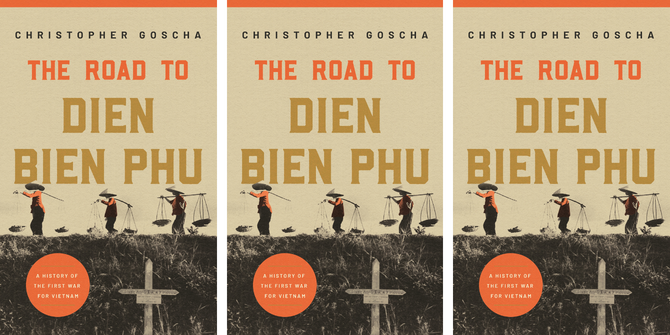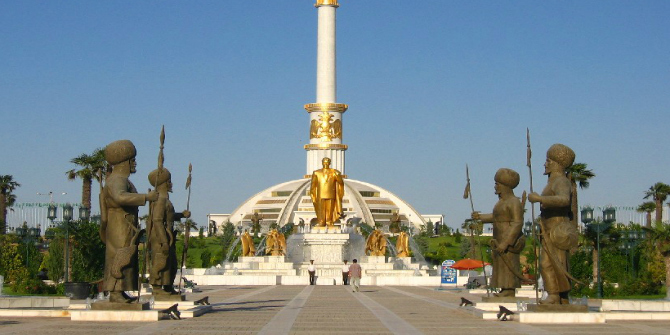 When China Rules the World considers how China has become a challenge to the West and is reshaping the global economy, but may not replace the US if it cannot make further cultural and institutional breakthrough. Ting Xu recommends this book to anyone interested in not only China and its future, but also the future of the West and the global world.
When China Rules the World considers how China has become a challenge to the West and is reshaping the global economy, but may not replace the US if it cannot make further cultural and institutional breakthrough. Ting Xu recommends this book to anyone interested in not only China and its future, but also the future of the West and the global world.
 When China Rules the World: The End of the Western World and the Birth of a New Global Order. Martin Jacques. 2nd Edition. Penguin Books. 2012. 812 pages.
When China Rules the World: The End of the Western World and the Birth of a New Global Order. Martin Jacques. 2nd Edition. Penguin Books. 2012. 812 pages.
Martin Jacques is a highly distinguished British scholar, writer and columnist. When China Rules the World, first published in 2009, is among his most important publications. Since then the book has been translated into eleven languages, and sold nearly a quarter of a million copies worldwide. The book’s focus on Asian modernity and the rise of China as a global power is of course highly relevant for contemporary concerns and interests in globalisation, as well as its implications for evaluating an evolution from the economic and geopolitical ‘great divergence’ to the recent rapid ‘convergence’ between China and the West. Jacques argues that the rise of China has not followed the Western model of a transition to modernity and will challenge the global dominance of the Western nation-state. China, as a ‘civilisation-state’, will soon rule the world. Its impact will be not only economic but also cultural, leading to a global future of ‘contested modernity’.
This excellent book raises more questions than it answers. China’s growth and transformation were and are path-dependant. Historians will ask: has China ever ruled the world before?
China did take centre-stage in the world economy, marking ‘the rise of the East in World History’ in the reign of Xuanzong (r. 712-756).[1] Nevertheless,China did not rule the world in its ‘golden age’ – the Tang and Song period (618-1279AD). The Tang (618-907) was economically prosperous and politically strong: the territory of China expanded and foreign trade was developed. Literature and arts attained high levels of development. The Song (960-1279) economy was even more remarkable for commercial and technological and urban growth. However, it was not nearly as politically and militarily successful as the Tang. The Song came under constant threat to its borders from the nomadic people.
Tang-Song China has been recognised as the most prosperous periods in Chinese history based upon cultural pluralism and the generation and diffusion of useful knowledge (proto science and technology) among cultural, intellectual and business networks. However, this efflorescence in Tang and Song China ended in a state of equilibrium. The Tang and Song cultural and institutional breakthrough did not continue. Cultural pluralism was superseded by unity. Although Neo-Confucianism at its early stage engaged in debates with other modes of thought and encouraged the studies of nature, it matured into state orthodoxy under the Yuan (1271-1368) and Ming (1368-1644) dynasties which failed to distinguish between science and other forms of knowledge.
Thus unlike Europe, the study of nature in China was not institutionalised. An entrenched civil service examination system diverted human capital to compete for bureaucratic office. Proto scientists and engineers did not organise themselves into professions and their individual studies of nature were not transformed into a collective effort. Technological capacities (based on curiosity about the natural world and the proto experiments of farmers and artisans) developed in Tang and Song China did not evolve into modern forms that are based on empirically and transparently tested scientific knowledge. China entered into a stable and a steady state in which economic growth depended on inputs of land and labour rather than science and technology.
The author argues that the economic and geopolitical divergence between China and Europe occurred as late as 1800. Yet the West’s surge to global supremacy was not just a late and contingent historical outcome. Structural and institutional divergence probably emerged in the Middle Ages. As Joseph Bryant argued, prior to any massive-scale social transformation, there must have been a period of preparation in which ‘a series of interdependent institutional and cultural developments unfolded cumulatively over the long-term’ to allow and propel such rapid change.[2] Indeed Jacques acknowledges some particular characteristics of Europe’s transition to modernity: threat from Islam, internal intra-continental conflicts, colonialism, the transition from an agrarian to an industrial society, and a cultural transformation into individualism (pp. 40-43). Yet he seems to have ignored one important factor behind the technological and economic divergence between China and Europe – the cultural and institutional regimes for generating and circulating useful knowledge (science and technology). There was ‘European exceptionalism’, fortuitously but fortunately, in these regimes throughout at least three centuries between 1500 and 1800.
So, will China rule the world again? In the spheres of innovation and education, China is displaying remarkable achievements. The government has the ability to mobilise a significant amount of resources and money to invest into high tech. Human capital is accumulating rapidly– the number of the science and engineering degrees granted by Chinese universities is now comparable to US total.
Yet the Chinese high-tech sphere also faces many challenges. The US (which has now superseded Europe as a metaphor for modernity) remains the ideal place for the Chinese elites to further their studies and to enhance their academic or professional careers. According to the figure from a survey by the Oak Ridge Institute for Science and Education in Tennessee, ninety-two percent of the Chinese who gained a PhD in science and engineering in 2002 were still in the USin 2007. TheUS continues to retain the best and the brightest Chinese students. Within China, becoming a civil servant remains the number one career choice for university graduates. Pursuing alternative careers in science and engineering or in private business sector seems less attractive.
There are also many obstacles to entrepreneurship and innovation. For example, it is still difficult for small-sized private enterprises to access bank loans. In many cases, the nature of the firm is unclear. The distinction between the public and the private is blurred. Furthermore, the protection of intellectual property rights needs to be developed and enforced. Chinese universities are still being run as government bureaus. Directors of universities hold governmental ranks. Space for free academic discussion and diverse modes of thought is still limited.
Similarly, many high-tech and innovation schemes are still directed by the top-down approach. Although to some extent it is efficient to mobilise resources and human capital, it is not encouraging for innovation in the long run. Furthermore, this approach and the involvement of the government could emphasise quantity rather than quality for R&D.
China has become a challenge to the West (in particular the US) and is reshaping the global economy. China will not replace the US if it cannot make further cultural and institutional breakthrough. When China Rules the World is a significant contribution to enquires into these questions. I recommend this book to scholars, students and people outside academia who are interested in not only China and its future but also the future of the West and the global world.
——————————————————————————————-
Dr Ting Xu is Research Fellow in the Economic History Department at the London School of Economics. She will be joining Queen’s University Belfast as a lecturer in law in December 2012. Her main research interests are in the fields of law, governance and development; property law; Socio-Legal Studies; Chinese law; and comparative law. Read more reviews by Ting Xu.
[1] S. A. M., Adshead, Tang China: The Rise of the East in World History (Basingstoke: Palgrave Macmillan, 2004).
[2] Joseph M. Bryant, “the West and the Rest Revisited: Debating Capitalist Origins, European Colonialism, and the Advent of Modernity,” The Canadian Journal of Sociology31, No. 4 (Fall 2006): 403.








The rise of China has been impressive they have totally outplayed western governments at the financial management game. Its got far past the point where a fair comeback is possible. The only two cards I can see left for the west if it wants to stop China ruling the world and the space around our planet is either to soon nullify the banks of China over China’s many human rights abuses or to find some other way of getting cash so we don’t have to go cap in hand to China every time we overspend ourselves again. If the West doesn’t stop giving endless and vast amounts of profit to China and continues blindly on its current path then China will eventually gain enough of a technological and military advantage to treat the rest of the people in the world exactly how it treats its own or worse. If the west stays on this current path China will be the only main power in the world and if you thought what the US has done to the world over the past 60 years was bad it will be seemingly nothing to you. Maybe I am being paranoid but when in our history has the country with the strongest military not tried to police the world within its sphere of influence. The above article indicates that China has to change culturally and institutionally before it can rule the world but when it develops the military might to make other countries back away which it is already beginning to do then it does not have to change in any culturally or institutional way at all to rule the world.
This comment has been edited to comply with our comments policy.